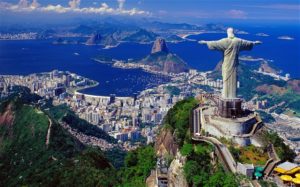Opportunities in Times of Crisis: Why It’s Time to Double-Down on Brazil
 In a few months Brazil will host its second global sports event in two years when the 2016 Summer Olympic Games are held in Rio de Janeiro. The last event was the 2014 FIFA World Cup. Logically, events of this scale should generate tons of good news and goodwill, but Brazil can’t seem to catch a break. Leading up to the last World Cup the country endured a constant stream of criticisms about the readiness of its stadiums and infrastructure. This year it’s worse. But this time it’s economic and political crises raining on the parade. The world’s seventh largest economy and Latin America’s largest nation is facing a perfect storm of economic recession, rising inflation, corruption scandals and political gridlock. The economy contracted by 3.8 percent in 2015, and the forecast for 2016 remains gloomy, with the president facing impeachment, inflation in double-digits and unemployment on the rise. But, to quote Warren Buffet, “Predicting rain doesn’t count. Building arks does.”
In a few months Brazil will host its second global sports event in two years when the 2016 Summer Olympic Games are held in Rio de Janeiro. The last event was the 2014 FIFA World Cup. Logically, events of this scale should generate tons of good news and goodwill, but Brazil can’t seem to catch a break. Leading up to the last World Cup the country endured a constant stream of criticisms about the readiness of its stadiums and infrastructure. This year it’s worse. But this time it’s economic and political crises raining on the parade. The world’s seventh largest economy and Latin America’s largest nation is facing a perfect storm of economic recession, rising inflation, corruption scandals and political gridlock. The economy contracted by 3.8 percent in 2015, and the forecast for 2016 remains gloomy, with the president facing impeachment, inflation in double-digits and unemployment on the rise. But, to quote Warren Buffet, “Predicting rain doesn’t count. Building arks does.”
Brazil’s economic history consists of a long series of booms and busts. Through the years, those who wrote off the country in tough times found themselves out of step when fortunes took a turn for the better. So, why would a brand want to invest in Brazil these days? Let’s start with the population of 200 million, which includes tens of millions who only recently obtained their first taste of luxuries such as smartphones, new vehicles, home improvements, entertainment options, and more. The current recession began in early 2014 and consumer spending has slowed. However, spending is falling from a historically high level, and the negative indicators cloud the fact that the immense Brazilian economy continues to soldier on.
Brazilians are still taking trips, spending on beauty products, subscribing to VOD services, buying electronics and even waiting in lines extending down São Paulo’s famous Paulista Avenue to buy ice cream at the new Ben & Jerry’s shop. The emerging middle class may be tightening belts now, perhaps having ice cream only once a week instead of three times, but these same consumers accounted for 60% of economic growth a few years ago. Many companies are hoping the Olympics will provide a boost to the sagging economy. According to the Rio 2016 Organizing Committee, brands will invest approximately $1 billion in Olympic sponsorships and marketing activities. NBC recently confirmed reaching $1 billion in ad sales, achieving the total much faster than with the 2012 London games and on track to reach the highest ad revenues in Olympic Games history. Automaker Nissan is sponsoring the arrival of the Olympic Torch, along with Brazilian banking giant Bradesco and Coca-Cola. Electronics company Panasonic is taking over part of Rio’s iconic Sugar Loaf mountain. Of course some of this spending is directed at a global audience, but many companies increased investments in Brazil far in advance of the games. When Brazilian consumers’ confidence returns, they will be looking for brands they know and trust. Regardless of the brand, building that trust in Brazil is far from easy and doesn’t happen quickly, so the time for investment is now.
This vast nation also needs infrastructure investment — roads, buildings, ports, telecommunications, utilities — to expand economic progress across its 3.3 million square miles. The corruption scandals involving state-controlled oil company Petrobras and local construction firms have slowed progress on government concessions, but shrewd new players from abroad and companies with smaller market shares may find growth and partnership opportunities within a corruption-weary government and private sector.
Technology giants such as Amazon Web Services, IBM and Salesforce continue to invest in Brazil as a large and important market for their cloud-computing businesses. In fact, many e-commerce and tech companies are finding fertile ground in Brazil. A recent World Bank study ranks Brazil fifth globally in the number of Internet users. Yet, the Brazil Communications Ministry reports that 45% of the population over 10 years of age, or approximately 80 million people, still do not have Internet access, indicating a huge opportunity for growth.
Looking for signs that the timing is right? Consider foreign direct investment of over $11 billion in the first two months of 2016, which follows December 2015 inflows of over $15 billion, more than twice the expected total. The U.S. Dollar goes much farther following the nearly 50% drop in value of the Brazilian Real in 2015. U.S. and Asian companies have recently planted stakes in the energy sector, and travel and tourism players have investment plans that extend far beyond this year’s Olympic Games. These movements show that companies are investing now to build strong post-crisis positions.
The 2016 Olympics won’t solve Brazil’s woes, as the country is experiencing a convergence of unusual and difficult circumstances. We will be showered with bad news for some time; but savvy marketers may consider taking their cue from Mr. Buffett and building an ark for their brands that will rise with the tide.

